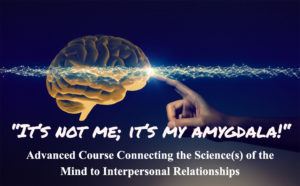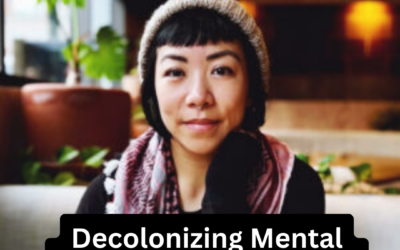Podcast: Play in new window | Download (Duration: 51:01 — 35.2MB)
Subscribe: Apple Podcasts | Spotify | Amazon Music
Skeptical of the buzz about psychedelic-assisted therapy? What if you could get the benefits of therapeutic psychedelics without ingesting any drugs?! Trey Ratcliff may have just the answer to non-drug, mind-expanding experiences that can help us heal.
We've been interested in the resurgence of research but have been waiting a while to do an episode on psychedelic-informed therapies until we were confident about which we speak. 🙂 We are skeptical ourselves about something that is purported to be a panacea by some, but also very excited about the potential benefits the research seems to be pointing towards. Plus… anything consciousness-raising – official therapy or not – is a good thing. So, when Sue stumbled upon Trey Ratcliff's Machine Elf creations we knew this was the way to begin the conversation with our audience.
In this concluding episode of Season 4, co-host Sue Marriott is joined by photographer, artist, and consciousnesses-raiser Trey Ratcliff. They dive right into the exotic world of mind-enhancing experiences. This includes both psychedelics but also non-drug experiences that can bring the promising results that are emerging from carefully studied psychedelic research.
Together they explore the history and effectiveness of drug-assisted therapy, address possible drawbacks, and attempt to explain what the mechanism is that can make these molecules so life-changing.
Who is Trey Ratcliff?
Trey Ratcliff is an artist on a mission to help spread consciousness and mindfulness to the world through photography and creativity. He has been an inspiration to Sue for years with his teachings about photography and life in general. He runs the #1 travel photography blog in the world, StuckInCustoms.com, where his photos have been viewed by 140 Billion (yes, B -illion) people. In addition to having the first and only HDR photograph to hang in the Smithsonian Museum, Ratcliff builds molecule-free psychedelic experiences using his background in Computer Science and Mathematics. Please do check out his work, you will be inspired.
What counts as a psychedelic experience?
Importantly, there are two types of mind-enhancing treatments.
First: Drug-Assisted
- Here, a trained counselor or therapist monitors an experience in a safe environment
- Unlike other drugs, psychedelics aren't just a form of escapism. They can help facilitate deep personal insight and growth.
- Currently, the FDA is in multiple Stage 3 and Stage 4 clinical trials of various psychedelic molecules. Ketamine is already in use and MDMA is on the fast-track for FDA approval due to the powerful therapeutic effects they are finding. Once those trials conclude, it is likely that this could become a widely available form of therapy, with other molecules to follow.
Second: Drug-less
- Ratcliff creates art videos with custom binaural music that can be enjoyed alone, or for best results paired with an app called Tripp. With this app and VR goggles, you can immerse yourself in a true virtual reality experience that potentially replicates the benefits of psychedelics without requiring the drug.
- These videos are built with complex fractal patterns set to music and are designed to be an immersive experience.
- Surprisingly, research is emerging that these naturally induced experiences can produce similar effects to a drug-induced experience. It is being researched now, but these intense immersive intentional meditations may indeed be able to produce the same key calming and settling effects.
- There are other forms of such non-drug-related transformations such as deep breath work, sweat lodges, native rituals that expand our mind, and many others.
What is the mechanism for the benefits that psychedelics provide?
Trey Ratcliff and Sue Marriott discuss the 2 schools of thought on what is transformative about these mind-altering experiences. Is it the drug itself, or is it what the unconscious delivers when freed to communicate in another form to our conscious self?
Why do we care about psychedelics?
- Importantly, psychedelic experiences can help us break out of our ego and connect with a deeper part of ourselves. Specifically, they can amplify and enhance our experience of consciousness.
- Our brains can work like ski slopes with deep ruts that we've built up over the years. A psychedelic experience can clear the path and help you think and express yourself in new ways. In this way, they can foster new relationships with ourselves and the world around us.
- Furthermore, years of data show that healthy psychedelic experience can be a short-cut for therapeutic treatment.
Trey's Machine Elf Creations
This is a see it to believe it bc it's hard to describe. Check them out here – we like the softer, “nicer” one's but if you let yourself experience a few of them they will draw you in, especially if you start with the prompted stories and let your mind expand with them. That is the Rorschach-part of the experience.
Some important comments
First, even though there are a ton of well-documented benefits to psychedelics, there are no guarantees in therapy. We imagine the technology will exist eventually to be able to identify different mind-expanding molecules for different mental health needs, for example, a specific PTSD experience that challenges one's world view but the research isn't quite there yet. We are promoting the idea of efficiency and effectiveness in treatment, and if these mind-enhancing experiences can safely speed up the painful therapeutic process and add consciousness to the world – then we are all for it. This is not evangelical, pro-drug propaganda saying everyone should trip (even though that is a cool thought)
Also, when exploring different psychedelics for the first time it is important to be very careful. An experienced guide can help keep you grounded and ensure you're taking what you're supposed to be taking. Your experience could backfire without that presence. Psychedelics can be like fire, if you don't respect them they can burn you, but if you take some simple precautions they can be beautiful, fun, and emotionally energizing.
References
Machine Elves on YouTube created by Trey Ratcliff
Multidisciplinary Association for Psychedelic Studies (MAPS) Program
“How to Change Your Mind: What the New Science of Psychedelics Teaches Us About Consciousness, Dying, Addiction, Depression, and Transcendence” by Michael Pollan
Trey Ratcliff's website for Stuck in Customs
His Twitter page
Adam Gazzaley's Neuroscape Website
Looking for CEU's?? We've got you covered, use OURCLAN for 10% off –
It's Not Me It's My Amygdala – Advanced Course Connecting the Sciences of the Mind to Everyday Relationships
FOUR hours of quality content and 3 CE's available to professionals.
Since you are this deep into our show notes, then you are indeed one of our peeps and thus invited to be part of our clan  GET 10% off this signature course by using code OURCLAN! –
GET 10% off this signature course by using code OURCLAN! –
Want more of this kind of in-depth discussion with quality content and real-world healing – join us on FB or better yet, join our Neuronerd Patreon community at patreon.com/therapistuncensored for as little as $5 per month. For $25 a month – we will meet you in person via zoom and feature you as our Co-Executive Producer on our website. Plus, everybody gets more cool content and some Therapist Uncensored bling at random times and be part of our community so you can discuss the relational sciences in-depth with your like-minded peers. Join us now.















